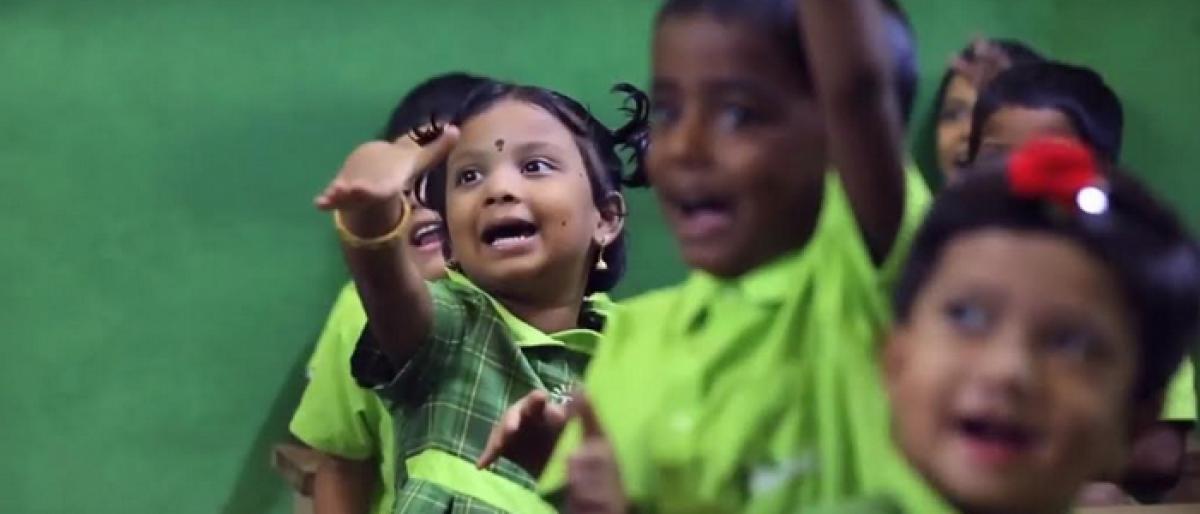Live
- Mandhana, Sutherland, Mlaba nominated for Women's Player of December
- Yunus government in Bangladesh set to acquit terrorist desperately wanted by US
- Drug trafficking cartel busted in Punjab, woman among four held
- Pakistan fined for slow over-rate in second Test vs South Africa
- Microsoft, SaaSBoomi to help create over 2 lakh job opportunities in India in next 5 years
- Delhi Dangal 2025: EC urges parties to maintain decorum during poll campaigns
- I will extend all possible support for the development of the college - MLC Kuchukulla Damodar Reddy
- Serie A: Como 1907 sign French goalkeeper Jean Butez
- GV Prakash’s ‘Kingston’ generates buzz
- Maha Cabinet makes toll payment through FASTag mandatory from April 1
Just In
Bridge Schools Achieved Learning Equity Among Underprivileged Communities: UK Govt Report


The UK Department for International Development DFID has applauded Bridge InternationalAcademies for achieving full equality of learning in its schools regardless of a childs socioeconomic background
Vijayawada: The UK Department for International Development (DFID) has applauded Bridge International Academies for achieving full equality of learning in its schools regardless of a child’s socioeconomic background.
In a report published recently, DFID said its commitment to innovative private sector’s role in improving service and opportunity for the underprivileged families in developing countries. Even though the report was based on Bridge schools in Nigeria, the findings can be clearly interpreted in an Indian context where the social enterprise runs a chain of English medium primary schools in underserved communities in Andhra Pradesh. The DFID findings build on the preponderance of evidence demonstrating that the methods used and support provided by Bridge to teachers and pupils lead to higher learning than the
traditional alternatives.
The DFID report pointed out that at Bridge schools, and only at the Bridge schools, parents’ income and education was not correlated to children’s learning outcomes. This is a landmark finding confirms that children from even the poorest families attain the same learning as those that are better off at Bridge schools.
Bridge school ensures that each child, regardless of family background, can achieve their full potential.The DFID findings contradict decades of global education research trends that demonstrate family background matters more than the school a child attends, in relation to levels of learning. At Bridge, this is not true.
A report author, Alina Lipcan, from Oxford Policy Management, said: “Good management matters, we find a strong correlation with better learning outcomes. As a next step, we would recommend more programmes focused on better management, so that more schools and pupils can benefit.”
Other highlights from the report’s findings include:
- A child’s family background has no impact on their attainment in class
- In literacy Bridge pupils know more than their peers in other schools
- The majority of children in Bridge schools are from poor families
- Bridge teachers have the best relationships with their pupils
- Bridge schools are managed more effectively than other types of schools
“Bridge schools are places of equal opportunity and equal learning benefits for all types of children, and especially for the poor. There is no learning gap at Bridge schools. This is a big deal. This study validates our methods, which ensure that all teachers have high expectations for every pupil, irrespective of their families income, prior educational attainment, or which language they speak at home.
This independent report shows that Bridge is helping children from underserved communities to learn, improving access to quality education, and enabling the best overall learning attainment in the local communities we serve. We can now say with total confidence that Bridge makes a significant and important overall contribution to education opportunities,” says Mr Ranjit Koshi, APs Managing Director of Bridge International Academies.
The UK Government now recognises that “the private sector, as well as the public sector, contributes to the provision of high quality education and that DFID therefore needs to work with the private sector as well as the public sector to improve education outcomes for children”. The UK Secretary of State for International Development, Penny Mordaunt, recently said, “We have tackled the dogma and culture that still exists in some parts of the aid sector, which not only sees organisations failing to put the beneficiaries first but also preventing the private sector from helping deliver those global goals.
The CEO of the IFC, Philippe Le Houérou, supported this view at the World Bank annual meetings in Bali last week, saying that: “We need to be imaginative and find new and more creative public-private solutions and, in many countries the governments are seeing the potential of working with the private sector.”
Dr. Shannon May was speaking in Delhi last week on the importance of private sector provision in achieving the SDGs. The DFID's finding endorses her statement now.

© 2024 Hyderabad Media House Limited/The Hans India. All rights reserved. Powered by hocalwire.com






